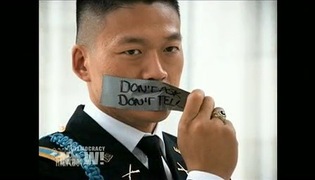
Guests
- Urvashi Vaidattorney and longtime gay rights activist. She is the former executive director of the Arcus Foundation and the former executive director of the National Gay and Lesbian Task Force.
A federal judge has ruled the military’s “Don’t Ask, Don’t Tell” policy toward gay and lesbian members of the military is unconstitutional. Judge Virginia Phillips said she will issue an injunction that will halt the enforcement of the policy that allows gay men and lesbian to serve in the armed forces as long as they do not disclose their orientation and do not engage in homosexual acts. [includes rush transcript]
Transcript
JUAN GONZALEZ: A federal judge has ruled the military’s “Don’t Ask, Don’t Tell” policy toward gay and lesbian members of the military is unconstitutional. In her decision, Judge Virginia Phillips wrote the policy, quote, “infringes the fundamental rights of United States service members in many ways.” Judge Phillips said she will issue an injunction that will halt the enforcement of the policy that allows gay men and lesbians to serve in the armed forces as long as they do not disclose their orientation and do not engage in homosexual acts.
AMY GOODMAN: We’re joined on the phone by Urvashi Vaid, an attorney, longtime gay rights activist, executive director of the Arcus Foundation, former executive director of the National Gay and Lesbian Task Force.
Welcome to Democracy Now! Can you talk about this late-breaking ruling yesterday, Urvashi?
URVASHI VAID: Thank you, Amy. It’s really significant and wonderful to see the vindication of what so many service members and experts on the military have been saying, that this policy, the “Don’t Ask, Don’t Tell” policy, needs to go, because it has no relationship to any legitimate government interest and because it’s discriminatory. I read the decision, and the findings were unequivocal, that based on the Fifth Amendment and the First Amendment, the court found that this is unconstitutional. What’s wonderful about it is that she rejects, the judge rejects, the longstanding arguments, very carefully rejects them, that somehow gay service members inhibit the preparedness of the military, that openly gay service members inhibit military readiness. There has been reams of data about refuting this contention, but the contention has been made again and again by members of Congress and members of the Pentagon who support this policy, despite the evidence of other militaries around the world where openly gay service members are serving and have served with no problem to the preparedness or unit cohesion of those militaries, despite the evidence of decades of studies from the RAND Institute, from the Defense Department itself, which were recited in this opinion.
AMY GOODMAN: So you have this unusual —-
URVASHI VAID: So it’s a positive opinion -—
AMY GOODMAN: Urvashi, you have this unusual situation where you have the Log Cabin Republicans, largest gay Republican political organization, suing the government.
URVASHI VAID: Yep.
AMY GOODMAN: Defense Secretary Robert Gates, Admiral Mike Mullen ask Congress to repeal the law. Obama says he’s not for “Don’t Ask, Don’t Tell,” though they could very well be appealing this decision.
URVASHI VAID: Yes. And I think that’s very problematic for the Obama administration. I think the politics of the situation, you know, are now up entirely. In May of 2010, the House of Representatives passed an amendment introduced by Congressman Murphy in which they said that the policy should be eliminated, that gay people should be allowed to serve openly in the military. It passed 234 to 194 in the House back in May. The Senate has not scheduled a vote. Senator Reid has refused to schedule a vote. And now there’s a new campaign to urge him to schedule a vote on the Senate side of this bill this September, in the next couple of weeks, because the Senate’s running out of time before they go on break. And the administration has said that it opposes the policy, and Secretary Gates has said he opposes the policy, but they have commissioned a working group, a Pentagon working group, to study the policy, and its recommendations are going to be submitted on December 1st.
So, everybody is kind of punting a little bit, and I think what this decision gives the administration the will power to — the muscle — what’s the word I’m looking for? — the backup to do is to stand by its convictions and say, “Look, the majority of the country is against this policy. The House has passed it. Many people on both sides of the aisle say this is time for this chestnut to go,” as Cheney said many years ago. He called it a bit of an old chestnut, I think, and then proceeded to enforce it. I think it’s time for the Obama administration to really direct the Justice Department to not do this.
AMY GOODMAN: Urvashi Vaid, we want to thank you for being with us, attorney, longtime gay rights activist. She’s executive director of the Arcus Foundation. Thank you so much.












Media Options